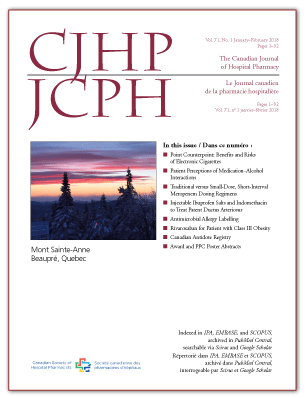Interaction between Psychotropic Medications and Alcohol: Perceptions among Patients Attending an Adult Mental Health Day Hospital Program
DOI:
https://doi.org/10.4212/cjhp.v71i1.1723Keywords:
psychotropic drugs, alcohol, drug–alcohol interactions, Perception, questionnaire, mental health, médicaments psychotropes, alcool, interactions médicamentalcool, perception, santé mentaleAbstract
ABSTRACT
Background: Interaction between alcohol and certain medications can lead to adverse consequences. Individuals with mental health disorders are particularly vulnerable because of their psychotropic medications, which are typically taken over extended periods and which are known to have pharmacokinetic and pharmacodynamic interactions with alcohol. It is unknown what education these patients receive from their health care providers and how such interactions are managed.
Objectives: To determine whether individuals with mental health disorders are aware of alcohol–drug interactions and if so, how they use such information.
Methods: A questionnaire was developed to explore the perceptions of mental health patients concerning alcohol–drug interactions. The questionnaire included questions in 3 domains: knowledge of potential alcohol–drug interactions, consumption of alcohol while taking psychotropic medications, and source of advice regarding the interactions. Attendees of an adult mental health day hospital program were invited to participate.
Results: A total of 131 participants answered the questionnaire between July 2014 and February 2015; 31 of the questionnaires were incomplete and were excluded from analysis. Of the 100 participants included in the analyses, 75 reported having received counselling from a health care provider about alcohol–drug interactions, and 49 of these reported following the advice provided. The most common advice reported by participants was to avoid alcohol consumption while taking medications. Serious adverse effects, such as worsening of a psychiatric condition, admission to hospital, and increased drowsiness, were reported by 23 participants. Sixty-nine participants considered physicians to be the best source of information about these interactions.
Conclusions: Most participants reported that they had received information about strategies to avoid negative consequences from alcohol–drug interactions. Nevertheless, consumption of alcohol occurred, and almost one-quarter of participants reported a serious adverse effect related to consuming alcohol. These self-reported data indicate that patients do not necessarily follow the advice of their health care providers. Future studies should explore reasons for the gap between advice and action and how to minimize it.
RÉSUMÉ
Contexte : L’interaction entre l’alcool et certains médicaments peut mener à des conséquences cliniques. Les personnes atteintes de troubles mentaux y sont particulièrement vulnérables à cause des médicaments psychotropes qu’ils prennent d’habitude sur une période prolongée et pour lesquels les interactions pharmacocinétiques et pharmacodynamiques avec l’alcool sont notoires. On ne sait pas quels conseils ces patients reçoivent de leurs fournisseurs de soins de santé et comment de telles interactions sont gérées.
Objectifs :Déterminer si les personnes atteintes de troubles mentaux sont conscientes des interactions entre l’alcool et les médicaments et, si oui, dévoiler comment elles agissent à la lumière de cette information.
Méthodes : On a mis au point un questionnaire pour enquêter sur les perceptions qu’ont les patients atteints de troubles mentaux des interactions alcool-médicaments. Les questions y étaient regroupées en trois catégories : conscience des interactions potentielles alcool-médicaments, consummation d’alcool en prenant des psychotropes et source des conseils sur les interactions. Les participants à un programme hospitalier de jour pour adultes atteints de troubles mentaux ont été invités à participer à l’étude.
Résultats : Au total, 131 participants ont rempli le questionnaire entre juillet 2014 et février 2015; 31 des questionnaires étaient incomplets et ont été exclus de l’analyse. Parmi les 100 participants inclus dans les analyses, 75 ont indiqué avoir reçu des conseils d’un fournisseur de soins de santé sur les interactions alcool-médicaments et 49 d’entre eux ont affirmé avoir suivi les conseils offerts. Le conseil le plus fréquent selon les répondants était d’éviter la consommation d’alcool lorsqu’on prend des médicaments. De graves réactions indésirables, telles que la deterioration d’un trouble psychiatrique, l’admission à l’hôpital et une somnolence accrue, ont été soulignées par 23 participants. Soixante-neuf participants considéraient les médecins comme les meilleures sources d’information à propos de ces interactions.
Conclusions : La plupart des participants ont indiqué avoir reçu de l’information sur les stratégies permettant d’éviter les conséquences des interactions alcool-médicaments. Certains ont tout de même consommé de l’alcool et près du quart des participants ont signalé une reaction indésirable grave liée à la consommation d’alcool. Ces données autodéclarées révèlent que les patients ne suivent pas nécessairement les conseils de leurs fournisseurs de soins de santé. Des études ultérieures devraient se pencher sur les raisons expliquant l’écart entre les conseils et les actions et sur les solutions pour réduire cet écart.Downloads
Published
Issue
Section
License
Copyright © Canadian Society of Healthcare-Systems Pharmacy.
After publication of a manuscript in the CJHP, the authors of the manuscript must obtain written permission from the CSHP (publications@cshp.ca) before reproducing any text, figures, tables, or illustrations from the work in future works of their own. If a submitted manuscript is declined for publication in the CJHP, all said rights shall revert to the authors. Please note that any forms (e.g., preprinted orders and patient intake forms) used by a specific hospital or other health care facility and included as illustrative material with a manuscript are exempt from this copyright transfer. The CJHP will require a letter from the hospital or health care facility granting permission to publish the document(s).










